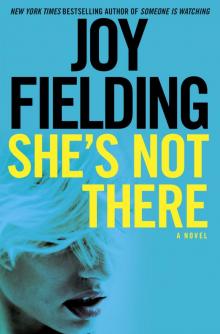- Home
- Joy Fielding
When I Looked Away
When I Looked Away Read online
WHEN I LOOKED AWAY
by Joy Fielding
Contents
Chapter 1
Chapter 2
Chapter 3
Chapter 4
Chapter 5
Chapter 6
Chapter 7
Chapter 8
Chapter 9
Chapter 10
Chapter 11
Chapter 12
Chapter 13
Chapter 14
Chapter 15
Chapter 16
Chapter 17
Chapter 18
Chapter 19
Chapter 20
Chapter 21
Chapter 22
Chapter 23
Chapter 24
Chapter 25
Chapter 26
Chapter 27
Chapter 28
Chapter 29
Chapter 30
Chapter 31
Chapter 32
Chapter 33
Chapter 34
Chapter 35
Chapter 36
Chapter 37
Chapter 38
An Exclusive Chapter From She’s Not There
More from Joy Fielding
About the Author
Copyright
Also by Joy Fielding
Answer Me
Don’t Cry Now
Good Intentions
Grand Avenue
Missing Pieces
Puppet
Run From Me
See Jane Run
She’s Not There
Someone is Watching
Take What’s Mine
Tell Me No Secrets
The Final Act
The First Time
The Other Woman
The Stranger Next Door
In memory of my wonderful father,
Leo Tepperman
Chapter 1
The nightmare began at exactly seventeen minutes after four on the last afternoon of an especially warm sunny day in April. Up until that moment Gail Walton had considered herself a lucky woman, and if one of the reporters who later thronged to her house at 1042 Tarlton Drive had asked her to name her reasons for so considering herself, she would have been able to do so easily.
Holding up the hands she would later use to shield her face from their cameras and the relentless, blinding flashes of lights, she would proudly enumerate the reasons for her good fortune with her long, elegant fingers. The first reason had to be Jack, a man as straightforward as his name, nothing fancy about him and perhaps a little rough around the edges, but a giving and honest man to whom she had been married the last eight years. The next two fingers would mark off each of her daughters, Jennifer and Cindy, two very different children by two very different men, which would bring down the fourth finger, the fourth reason Gail Walton considered herself a lucky woman, her ex-husband Mark Gallagher. Not all women enjoyed the easy, relaxed relationship Gail could claim with her ex-husband, and though it hadn’t always been such, the last few years had brought each of them to the pleasant realization that perhaps their five years together had not been so misspent after all.
She was approaching forty with the energy and appearance of a woman at least a decade younger, and her health had always been good. She lived in a nice house in a nice city, and if Livingston, New Jersey, didn’t exactly spell the excitement and romance of New York, it was still a safer and calmer place in which to live and raise a family. Besides, New York was less than an hour’s drive away, even in the worst of traffic, and thanks to Jack’s very substantial income—he was a veterinarian—they were able to make the trip into the city as often as they liked. Jack’s income also afforded her the luxury of not having to work at a full-time job herself. She’d had enough of that in the years following her separation and divorce from Mark, when she’d been forced through necessity to leave her small daughter with her mother while she worked as a bank teller to support them. Now she was able to relish long lunches with her friends who, more often than not, had to dash off to return to their jobs, leaving her to linger over her coffee and to contemplate their parting looks, filled with an equal mixture of envy and confusion. Envy because she didn’t have to rush to a job she found less than satisfying, and confusion because didn’t she know that working outside the home, having a career, was essential to a woman’s satisfaction? What was she doing spending all her time at home looking after a six-year-old?
She’d given up trying to explain her motivations to her working friends. The fact was that she simply enjoyed being a stay-at-home mother, being there for her daughters when they returned home from school, and it was her deep conviction that her sixteen-year-old needed her there every bit as much as her six-year-old. She remembered how much she’d liked having her own mother at home in the years when she was growing up. Besides, she was not entirely without outside ambitions. A gifted piano player all her life, she had recently taken to giving piano lessons to a number of children in the area, and her pupils now numbered five, one for every day of the school week. Ranging in age from eight to twelve, they came to her house at four o’clock every afternoon for half an hour. Jennifer was busy with her homework at that time; Cindy was addicted to “Sesame Street.”
Another reason to be considered lucky, she would have told anyone who asked, was her parents. Both were alive and well and retired to Florida where they lived in a bright and spacious condominium right by the ocean. In the four years since they had moved to Palm Beach, Gail and Jack had visited them at least once a year, always with the girls, and once a year her parents journeyed back to Livingston to look after the children while Gail and Jack took some much needed time to themselves. Their close friends, Laura and Mike, both professionals, he a lawyer, she a social worker, childless by choice, were always chiding them over their seeming rut. Florida with the kids in the winter, Cape Cod by themselves in the summer. Laura and Mike were always disappearing into the more exotic locales on this earth—India last year, China the year before that. Gail had no deep desire to see India or China. They seemed so far away from everything that made her feel safe—her home, her family, the city she grew up in.
Maybe she was in a rut, Gail would have had to confess, but it was one of her own choosing. She had never felt comfortable with too much excitement. It was one of the reasons her first marriage had ended and her second was so successful. Mark had been unpredictable; Jack plotted out every move. Mark would get into his car—always a foreign sports car, sleek and metallic and bright—and just drive. He never knew where he was headed; he never consulted a map. If he got lost—and he was always getting lost—he would drive for hours rather than stop to ask for directions. He didn’t seem to care if he ever got where he was supposed to be going. Jack Walton, on the other hand, was a man of lists. His time was highly organized and each minute was accounted for. As each item on his list was accomplished, it would be crossed out with a neat black line. If Jack was going anywhere, to another city or just another part of town, he would get out the map the night before and plan his route. He drove a new car every two years, always American, always white, and he was never late. Mark had made Gail very nervous; Jack made her feel secure.
More than anything else about her life, Gail liked this feeling of security. Her sister Carol was entirely different, more like Mark, and Gail had often thought her first husband would have been much happier with her younger sister. But Carol, who had obviously adored him, was too restless to wait out the five years it took for Gail’s marriage to fall apart and had moved to New York, where she had taken up residence with first one painter and then another before moving on to dancers and then, probably for the sheer perversity of it, a stockbroker with whom she had been living for the last two years. Mark himself had gotte
n married again three years ago to a wonderful woman named Julie who seemed devoted to him and who treated Gail’s daughter Jennifer as lovingly as if she’d been her own. It was something else that Gail felt thankful for.
Life, she would have told the newspapers that later clamored for her statements when she was too weak and sick to answer them, was exactly as she would have wished.
She rarely varied her routine. Her alarm went off at precisely seven-fifteen on school days and she never had any trouble getting out of bed. Always an early riser, mornings were her favorite time. She would shower quickly and dress and then go downstairs to get breakfast ready, giving everyone else in the house the extra time to sleep. She liked this time to herself, her hands busy setting the table and making the coffee, her mind free to wander without having to think about anything in particular. It relaxed her for the next hour when she was rushing around frantically trying to get everyone ready and out of the house in time for school and the office.
Jennifer was the worst. A typical teenager, she stayed up too late at night and had trouble waking up in the morning, no matter how long Gail tried to let her sleep. In the end, after gentle shakings and soft words had inevitably failed to reach her subconscious, Gail was forced to physically drag her older daughter out of bed, and only then, when she was sprawled across the floor like a rag doll, would Jennifer’s eyes begin gradually to open.
Cindy was much easier, as she had been in every respect since she was a baby. It took only a soft stroke of Gail’s hand across the child’s forehead to get her to open her big blue eyes. Immediately, Cindy’s arms would reach up and pull her mother to her, locking her in a warm, loving embrace. Gail would then go through the motions of trying to select something for her daughter to wear. Whatever she picked was invariably wrong, for Cindy, a child who was remarkably easygoing about every other aspect of her life, was unaccountably stubborn about what she wore. Many a day Gail would silently pray that Cindy’s teacher realized that the child dressed herself and that her mother was neither color-blind nor a hopeless eccentric. Today, despite the heat, Cindy had insisted on wearing a purple velvet dress which had been a gift from her grandparents and which was at least one size too small for her, because it was her favorite dress and she hadn’t worn it in a long time. When Gail pointed out that the reason she hadn’t worn it in so long was precisely because it was too small, Cindy merely fixed her mother with an icy stare and protruding lower lip, and waited for Gail’s inevitable capitulation.
By this time, Jack would be in the shower and the coffee would be ready. Breakfast was always noisy and rushed, and by the time everyone left the house at eight-thirty, Gail was ready for another cup of coffee and some time to relax and read the paper before straightening up the kitchen and then heading back upstairs to make the beds. Jack drove the kids to school on his way to work. Since both schools were in the neighborhood, both children walked home, Cindy always in the company of one of her classmates and the child’s nanny. Gail was always at home waiting for their return at approximately three-thirty. She then had almost half an hour to go over the events of their day with them before her student arrived for her lesson.
The hours while her daughters were away at school were spent the way most middle-class housewives spent them: running small errands, making phone calls, grocery shopping, the occasional appointment at the hairdresser’s, lunch with a friend, more errands, preparing dinner, waiting for her family to come home. If anyone had asked her to describe her life up until the moment she had turned the corner onto Tarlton Drive at exactly seventeen minutes past the hour of four on that sunny April afternoon, Gail Walton would have said that she was the face of average America, middleaged, middle-class and middle-of-the-road. While she recognized that it was a description virtually all her friends would shun, it summed up everything Gail felt comfortable being.
She had no desire to stay young forever. Her own youth had been something less than spectacular. Shy and flat-chested, she had been largely spurned by the more popular cliques in high school, virtually ignored by the boys she admired. Only in her thirties had Gail begun to feel truly at home in her own skin. She was probably the only person she knew who actually looked forward to turning forty. So far, anyway, she had managed to avoid the mid-life crises her neighbors all seemed to be suffering through. She was neither frustrated by her lot nor bored with her lack of ambition. She was well read, kept abreast of current affairs, and was increasingly confident of her ability to hold up her end of any conversation. She belonged to no political party, and had somehow managed to avoid being radicalized by the sixties and the war in Vietnam, possibly because of her natural shyness and an innate tendency to avoid any kind of overt confrontation. The only vaguely radical thing she had ever done was to leave college before her last year was completed to marry Mark Gallagher. She often regretted her lack of a university degree, but never enough to go back to school to get it. She belonged to no groups. She respected everyone’s right to be whatever he or she wished to be, and expected the same consideration from others. Her friends admired her inner peace, her seeming serenity. They sought out in her all that was normal. They asked for her advice; they relied on her common sense; they looked to her for the reassurance that all could be right with the world, and that if you were basically an honest individual, you would be justly rewarded. If asked to sum herself up on one word, Gail Walton would have chosen “content.” She was everything she had ever wanted to be.
And then it was seventeen minutes after the hour of four on an especially warm, sunny April day, and everything changed.
Chapter 2
She saw the police cars as soon as she turned the corner, and knew immediately, instinctively, that they were parked in front of her house. Her first reaction was panic. She dropped the few parcels she was carrying and stood, unable to move, staring straight ahead, her breath holding her stomach in tightly, pressing into her back. In the next instant she was running toward her house, unmindful of the bags she had dropped, seeing only the police cars, knowing as she glanced down at her watch and saw that it was seventeen minutes after four, that for her time had stopped.
Later, much later, when the sedative they would give her was starting to take effect and her mind was hovering in the mid-ground between dreams and reality, her thoughts would keep returning to how her day had been spent, how things might have been different. That somehow it was her fault. She had changed the routine.
Lesley Jennings’ mother had called first thing in the morning, just after Jack and the girls had left, to tell her that Lesley had spent the better part of the night throwing up and must have picked up some flu bug at school and therefore would not be able to have her regular Friday afternoon piano lesson. Gail had commiserated with the young mother, remembering how upset she used to get whenever Jennifer came down with anything, realizing how calm she was with Cindy, and telling the young woman what she was sure her doctor had already told her, to keep the child quiet and in bed, no solid foods and lots of liquids. Mrs. Jennings seemed grateful for the advice, confiding with obvious guilt that she was desperately trying to locate someone to come and stay with Lesley while she ran off to work. Gail told her about the daughter of a friend who had recently dropped out of school and might be interested in picking up a few extra dollars by baby-sitting, and again Mrs. Jennings was grateful, adding that she hoped Gail’s children would be spared the flu bug which seemed to be sweeping the Livingston school system, probably because of all the rain they’d been having lately and wasn’t it just typical that the child would get sick when it finally looked as if the weather was starting to break. Children were just little incubators for germs, Gail remembered thinking as she hung up the phone.
On impulse, and because it was such a surprisingly nice day, too nice to spend indoors, she had picked up the phone again and called her friend Nancy, the most frivolous of all her friends, frivolous because Gail doubted that a serious thought had ever passed through the woman’s head. She was forty
-two years old; her husband had left her five years earlier for a younger woman, and now Nancy Carter divided her time between visits to her masseuse and tennis lessons at her club. She was an avid, no, a fervent consumer, and she was never happier than when spending money, specifically her ex-husband’s money. She was a follower of astrology, the occult and ESP. She believed that she could tell the future, although when her husband had announced his intention to leave her for the woman who regularly manicured his nails, she had been the only one in their immediate circle who was surprised. She never read past the entertainment section of the newspaper, and would have been hard-pressed to name either of her state’s senators, although she knew all about Dustin Hoffman’s private life and Joan Collins’ rather more public affairs. Despite what her other close friend, Laura, referred to as Nancy’s lamentable lack of depth, Gail had always found her shallowness and utter self-absorption entertaining, and today a little light gossip and some heavy-duty shopping seemed just what the sunshine ordered. The girls needed some new spring clothes, and for that matter, so did she. Gail had reached Nancy just as she was about to leave the house for a reading with her psychic and they arranged to meet for lunch at Nero’s.
Lunch had been entertaining and fun. Gail didn’t have to contribute much. She just had to sit there and smile as Nancy did the talking. Nothing was required of her except to listen and look attentive. If Nancy said something about which she disagreed, she kept this to herself. Nancy was not interested in her opinions; she was interested only in her own. Gail thought as she listened to Nancy talk about her visit to the psychic that Nancy Carter was probably the most self-centered woman she had ever met. No matter what anyone said, no matter what was happening in the world, she would find some way to relate it to herself. If the talk turned to Indira Gandhi and the precarious political position she found herself in, Nancy Carter would say, “Oh, I know just how she feels. The same thing happened to me when I was running for president of my club.” It was her greatest failing as a human being and her greatest charm. Gail’s friend Laura professed shock at this attitude, rolling her eyes skyward at the slightest provocation whenever the three women were together, but Gail had long ago learned to accept the fact that if you wanted to talk to Nancy Carter, you talked about Nancy Carter.

 The Stranger Next Door
The Stranger Next Door Cul-de-sac
Cul-de-sac The Final Act
The Final Act When I Looked Away
When I Looked Away She's Not There
She's Not There All the Wrong Places
All the Wrong Places Now You See Her
Now You See Her Don't Cry Now
Don't Cry Now Good Intentions
Good Intentions Still Life
Still Life Lost
Lost The First Time
The First Time Whispers and Lies
Whispers and Lies The Other Woman
The Other Woman Charley's Web
Charley's Web Mad River Road
Mad River Road Puppet
Puppet Life Penalty
Life Penalty The Wild Zone
The Wild Zone Home Invasion
Home Invasion Someone Is Watching
Someone Is Watching Heartstopper
Heartstopper See Jane Run
See Jane Run The Bad Daughter
The Bad Daughter Shadow Creek
Shadow Creek Missing Pieces
Missing Pieces Kiss Mommy Goodbye
Kiss Mommy Goodbye Grand Avenue
Grand Avenue